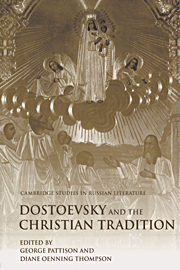Book contents
- Frontmatter
- Contents
- Notes on contributors
- Acknowledgments
- Notes on conventions and abbreviations
- Introduction: Reading Dostoevsky religiously
- PART I DOSTOEVSKY AND THE PRACTICE OF ORTHODOXY
- 1 Dostoevsky and the kenotic tradition
- 2 Dostoevsky's markings in the Gospel according to St John
- 3 Icons in Dostoevsky's works
- 4 Problems of the biblical word in Dostoevsky's poetics
- PART II DOSTOEVSKY AND CHRISTIAN THEOLOGY
- PART III READING DOSTOEVSKY RELIGIOUSLY: CASE STUDIES
- Bibliography
- Index
- CAMBRIDGE STUDIES IN RUSSIAN LITERATURE
4 - Problems of the biblical word in Dostoevsky's poetics
Published online by Cambridge University Press: 02 December 2009
- Frontmatter
- Contents
- Notes on contributors
- Acknowledgments
- Notes on conventions and abbreviations
- Introduction: Reading Dostoevsky religiously
- PART I DOSTOEVSKY AND THE PRACTICE OF ORTHODOXY
- 1 Dostoevsky and the kenotic tradition
- 2 Dostoevsky's markings in the Gospel according to St John
- 3 Icons in Dostoevsky's works
- 4 Problems of the biblical word in Dostoevsky's poetics
- PART II DOSTOEVSKY AND CHRISTIAN THEOLOGY
- PART III READING DOSTOEVSKY RELIGIOUSLY: CASE STUDIES
- Bibliography
- Index
- CAMBRIDGE STUDIES IN RUSSIAN LITERATURE
Summary
Dostoevsky is hailed as a great Christian writer and a profound, innovatory depictor of the modern human condition. Precisely this combination raises intriguing problems for interpretation. In notes written towards the end of his life, Bakhtin observed:
Irony has penetrated all languages of modern times (especially French); it has penetrated into all words and forms <…> Irony is everywhere – from the minimal and imperceptible, to the loud, which borders on laughter. Modern man does not proclaim; he speaks. That is, he speaks with reservations. Proclamatory genres have been retained mainly as parodic and semi-parodic building blocks for the novel. <…> The speaking subjects of high, proclamatory genres – of priests, prophets, preachers, judges, leaders, patriarchal fathers, and so forth – have departed this life. They have all been replaced by the writer, simply the writer, who has fallen heir to their styles <…> Literature has been completely secularised.
This, paradoxically, is both true and untrue for Dostoevsky. He was a master of irony, of the word spoken with reservations, but his works are hardly ‘completely secularised’. The Christian worldview permeates and shapes all Dostoevsky's post-Siberian works, from the large narrative structures of his redemptive plots, whether failed, realised or suspended, to single words charged with Christian significance. By ‘the biblical word’ is meant any saying, image, symbol or thought whose source can be traced to the Bible. It is by his use of this word, with its distinctive content, stylistics and emotional tonalities, that Dostoevsky belongs to Christian art.
- Type
- Chapter
- Information
- Dostoevsky and the Christian Tradition , pp. 69 - 100Publisher: Cambridge University PressPrint publication year: 2001
- 1
- Cited by



